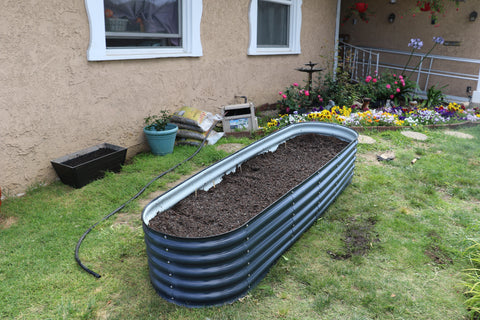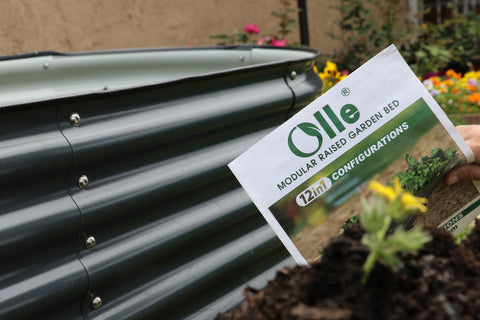Tips from Olle Garden Bed: Should You Fertilize Your Garden in Winter
Do you like the feeling of fresh dirt between your fingers? The fun of gardening is endless. Whether you are a novice or an experienced gardener, there is always something new to learn. For example, should you fatten your garden in winter? The following content also has some reference value for raised garden beds.
While taking care of your garden, you can do many things in winter to help ensure its success in spring. Here are some tips on whether and when to fertilize your garden so you can make the most of it!

Fertilize your garden in winter. - Good idea or bad idea?
The answer is - it depends! There are two schools of thought. Some experts said that if the selected garden plants did not perform well, they would be given a good idea, while other experts disagreed. Ultimately, the decision whether to apply fertilizer depends on the plant's health and climate.
Trees and shrubs
If you notice that the established trees and shrubs look a little discoloured, or do not produce as many flowers or fruits as usual, it may be time to give them some motivation.
In fact, late autumn (late October, before the ground freezes) is the best time to apply slow-release nitrogen fertilizer, because it helps bring nutrients back to the soil before winter. If you think your trees or shrubs can use some extra love this season, please fertilize them immediately! Just make sure not to overdo it or make it routine. Too much fertilizer can actually hurt plants, not help them grow.
Interesting fact – late autumn fertilizer is also very suitable for lawns!
Rosebush
There is a lot of wrong information about when and not to fertilize the rose bushes. Some people think you should never fertilize them in winter, while others think it's good to do so.
Generally speaking, if you live in a cold winter area and your roses are dormant during this period, it is better to avoid fertilizing them before the spring comes. This will allow your bushes to focus all their energy on preparing for the new growing season without having to deal with the extra nutrients that are difficult to deal with in the cold months.
Perennials
Most of the time, you can insist on applying slow-release nitrogen moderately to perennial plants, and be careful not to damage the roots. If your plant still looks a little wrong after fertilization, it is important to be patient. Give your plants a little time to recover from the treatment, and they will recover to their best condition soon!
Although some people say that fertilizer should not be used in late summer or early autumn, because new growth may form and cannot mature in time to cope with bad weather.
Garden winter care tips
Winter can be a difficult time for the garden, because cold temperatures and heavy snow can cause serious damage to your plants and flowers. In order to help your garden stay healthy and prosperous in winter, you should keep some key nursing skills in mind.
Watering
Autumn is the best time to water trees and shrubs. As the temperature began to drop, it was natural to think that watering should also stop.
However, this is not true! In fact, for many drought intolerant plants, cool weather may actually be a period of great pressure. This is why if there is a lack of rainfall, it is important to continue to water trees and evergreen trees once a week. Then, once the ground freezes, stop watering.
Windproof
No matter where you live, the winter wind will pose a major threat to your garden health. Especially if you have young, immature plants.
These cold gusts can dry your plants, causing them to lose the water they need to grow and survive. In addition, salt fog can damage trees growing near major roads or highways.
Fortunately, there is a simple and affordable way to protect your evergreen trees from these harsh winter winds: the hessian screen! These windbreaks are made of burlap fabric and stretch between the poles, allowing all necessary light and moisture while protecting your plants from dry winds.
A strong warning - do not let the burlap touch the plants below. The freezing on the top of the burlap may burn the plants inside.
Remediation of soil
When your soil tests show high pH, you know it's time to take action. One of the simplest ways to reduce pH is to mix granular sulfur into the soil of acid loving plants, such as Fothergilla, hydrangea, azalea, azalea or blueberry. You can reapply in spring for best results.
You can also plant mulch crops to repair the soil, so that you have a healthy foundation in spring.

Cover
Looking for the perfect way to protect your trees and perennials? Cover! Place a layer of 2 to 3 inches of crushed bark over the entire root area of the tree. This mulch not only helps to insulate and protect the roots of trees, but also helps to keep moisture in the soil. For perennials, it is best to cover the ground with 2 to 3 inches of oak after freezing the solid.
But we must not overuse "volcanic cover". When you start to pile mulch around tree trunks, you may encourage pests and insects to take refuge there or create conditions conducive to fungal infection.
Deer and rodents
If you want to protect your garden from deer, a good strategy is to use fences or nets. You can enclose the whole part of the deer's favorite garden. Another option is to wrap smooth bark to prevent young stags from rubbing antlers on them. Although commercial and homemade insect repellents may provide some temporary relief, barriers are by far the best way to keep these creatures away from your precious plants.
If you are worried about rodents in your garden, you can take some simple steps to protect the plants. First, look for places where mice or voles might survive the winter. This could be piles of bushes or leaves, firewood piles and other areas that provide shelter from the wind and rain and protection from predators. For example, if ornamental grass is planted next to the crab pear tree, rodents will eat the bark of the crab pear tree during the whole cold season, so that they can spend the winter happily in the hay.
